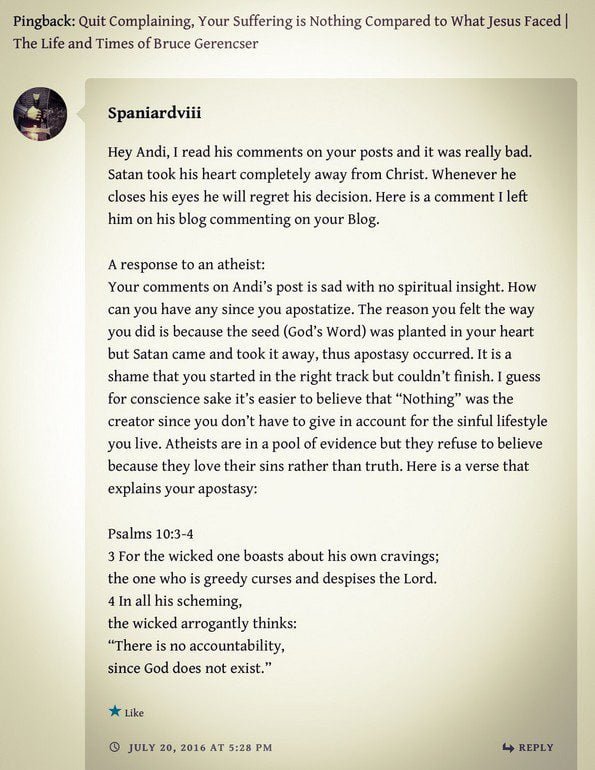
“Let’s say our faith was like a sweater. Yarn: our ideology. Weave: our tradition. This is how you wear it. Don’t change it, even if the sweater doesn’t keep you warm any more. Even if it’s too tight or the threads cut off oxygen at your neck. This is the way. Doubts and questions mean disrespect, and those are the seeds of evil, so just don’t.
But over the years, a thread comes loose and you try to just tuck it in alongside the others. You can cover the fraying up. You can pull the thread and think, ‘Oh, I don’t need this one, because it is harmful to me; it’s itchy and gets caught on corners.’ It comes out easily. And the sweater stays together. Then you pull another, and another, and soon you find all the yarn is gone. You have deconstructed the entire thing. You are left naked. People gawk and run away, and you feel two opposing things: the freedom of glorious nakedness, and the fear of the same.”
— Lisa Gungor, writing in her memoir The Most Beautiful Thing I’ve Seen
Deconstruction in an Evangelical context is the reexamination of one’s beliefs. The reexamination often leads to changed theological/social/political beliefs. Sometimes it leads to an abandonment of Christianity altogether. Not everyone who deconstructs becomes an atheist or an agnostic, but many do. Others move on to kinder, gentler expressions of faith or embrace paganism, spiritualism, or a plethora of other religions. And yes, some people, after carefully reexamining their beliefs, remain Evangelicals.
I follow and read over one-hundred Evangelical blogs and websites, along with listening to a handful of Evangelical podcasts. (I wade in the sewer so you don’t have to.) This allows me to stay in the Jesus loop, even though I haven’t been a Christian for fourteen years. I have noticed an increasing number of sermons, articles, podcasts, and blog posts about Evangelicals who are deconstructing. Most of these media points take the approach that doubts and questions are fine — deconstruction — as long as people remain in the church. Those who exit stage left are attacked and mocked. How dare they leave Jesus! How dare they stop attending church and putting money in the offering plate — they never, of course, say the offering part. How dare they come to different conclusions from those of their pastors. How dare they abandon the one true faith — Evangelical Christianity.
All sorts of excuses are given for why people deconstruct: poorly taught, wrong beliefs, negative church experiences, falling out with church leaders, secret desire to sin, and a number of other excuses. What these Evangelical preachers and talking heads never do is take deconstruction (deconversion) stories at face value. Instead of asking the people deconstructing why they are doing so, these Evangelical gurus impute motives on doubters they do not hold. In other words, they are dishonest interlocuters.
Recently, Evangelical megachurch pastor Matt Chandler had this to say about deconstruction (via Neil Carter’s blog):
You and I are in a day and age where deconstruction and the turning away from and leaving the faith has become some sort of sexy thing to do. I contend that if you ever experience the grace and mercy of Jesus Christ, actually—that that’s really impossible to deconstruct from. But if all you ever understand Christianity to be is a moral code, then I totally get it.
Former Evangelical Neil Carter had this to say about Chandler’s statement:
Leaving aside the quibbling over semantics, his posture towards the topic made me bristle for the same reasons it did most other exvangelicals: There is nothing sexy about deconstruction. It is a gut-wrenching, disorienting experience, and no one who has walked through it would ever portray it in the glib, shallow way Chandler did.
He rounded up the usual suspects in his effort to invalidate the process, assuring his listeners that people only leave because they didn’t really understand their faith correctly. Surely they are rejecting some other form of Christianity, most likely a shallow, legalistic version gleaned from a superficial reading of the Bible. Or maybe somebody was mean to them, yada yada. I’ll spare you my rants about those theological scapegoats today.
What gets me most is how naturally Chandler falls back on peer pressure as the culprit. Like we’re back in youth group again. He’s convinced people are only doing this because everyone else is doing it and they want to be cool, too.
I wonder which of our tactics gave us away? Was it the way we enroll our children in weekly group lessons aimed at convincing them to disbelieve in his religion, teaching them songs to go along with each topic? Or maybe it’s the weekend-long retreats where we all hold each other, crying around a campfire as we each talk about how our rejection of faith has made our lives complete?
Chandler, of course, is saying that “real” Christians never, ever walk away from Jesus. Thus, those who do weren’t “real” Christians to start with; that we had some sort of defective, dead faith. However, our stories suggest that Chandler — let me speak bluntly — is full of shit. I know countless former Evangelicals who held orthodox Evangelical beliefs; people who devotedly and unreservedly followed after Jesus Christ; people who gave their time, money, and talents to the advancement of the Kingdom of God; people whose lives were shining examples of what it meant to be a follower of the one true God. Don’t believe our stories? Ask the people who knew us best: our families, friends, and fellow church members, if we were born-from-above, Holy Ghost-filled, adopted children of the Triune God. Ask them about how we lived our lives. Ask them about our devotion to the things of God. I know as far as my life is concerned, I was a real Christian, and critics who suggest I never will search in vain for anyone who knew me who will say that knew I was an unbeliever.
John Cooper, the lead singer for the Evangelical Christian rock band Skillet, took matters a step further when he said:
I don’t even like calling it deconstruction Christian. There is nothing Christian about it. It is a false religion.
And for all those formerly Christian people who have tried to tell all these young folks that they think they found a third way. Their third way is this: It’s OK if you’re into Jesus, just don’t be into the Bible. I’m here to tell you young folks, there is no such thing as loving Jesus but not loving his Word.
A false religion? Child, please. What’s with all the hysteria over deconstructing Evangelicals? Here’s what I see and hear: fear. Young adults, in particular, are exiting Evangelical churches in record numbers. More and more people are saying they are atheists or agnostics or NONES — people who are indifferent towards organized Christianity. Powerless to stem the tide (and God seems quite indifferent), Evangelicals such as Chandler and Cooper lash out at the people who dare to say the emperor has no clothes.
Eric Scot English, a progressive Christian, wrote an article titled Why Evangelicals Hate Deconstruction that said, in part:
Public critiques from evangelicals regarding deconstruction are on the rise over the last few years. Do you ever wonder why? I mean, what could be the harm in thinking critically about matters of faith? Wouldn’t any denomination or church movement encourage such thinking as a means for people to grow in their faith? In this article, I will provide two reasons why evangelicals hate deconstruction and why they continue to call it “dangerous”.
First, it’s important to understand what it means for someone to “deconstruct” their faith. To be clear, religious deconstruction is not the same thing as philosophical deconstruction (which was espoused by postmodern philosopher Jacques Derrida.) Religious deconstruction is the tearing down of theological presuppositions and beliefs in order to reconstruct beliefs under a new paradigm. That new paradigm does not have to be a different denomination or religion, but it often results in a significant change.
Usually, doubt is the catalyst that demonstrates the need for deconstruction. Therefore, all deconstruction is built upon the foundation of doubt. This is an important idea for people who experience doubt to understand. Doubt is healthy and doesn’t necessarily lead to a weakening of one’s faith. There are many people in evangelicalism who begin to doubt and become atheists as a result. This is largely because evangelicalism discourages doubt when they should see it as an opportunity. Instead of becoming an atheist, which is a huge leap from doubt, the individual should consider going through a journey of deconstruction. Deconstruction is the only way that harmful beliefs can be dealt with religiously. However, deconstruction cannot happen in isolation. It must be followed by reconstruction.
Oftentimes missing from the critique that evangelicals raise about deconstruction is the reconstruction journey that often follows. Reconstruction is the rebuilding of religious beliefs upon the new paradigm that the individual has established. Reconstruction allows the individual to find their own beliefs instead of what has been spoon-fed to them most of their religious life. The fact that reconstruction is rarely, if ever, mentioned in evangelical conversations bolsters the fact that they fail to understand the basic concepts of deconstruction on the whole.
….
There is nothing inherently wrong with deconstruction. It is a process that I would recommend to anyone who wants to develop critical thinking and have faith that is their own and not something that was simply handed to them. Those who deconstruct often find a new sense of enlightenment (no pun intended) that may result in some grief over the faith they knew, but that ultimately grows into excitement about the process.
My only quibble with English is over his suggestion that atheism shouldn’t be the end game. Don’t throw the proverbial baby out with the bathwater. (Atheists ask, what baby?) Much like the Evangelicals he rightly criticizes, English says that “faith” is the desired outcome — just not the Evangelical version of faith. English says:
There are many people in evangelicalism who begin to doubt and become atheists as a result. This is largely because evangelicalism discourages doubt when they should see it as an opportunity. Instead of becoming an atheist, which is a huge leap from doubt, the individual should consider going through a journey of deconstruction.
English implies that the path from Evangelicalism to atheism doesn’t involve reconstruction. He really misses the mark on this point. As a man who was an Evangelical pastor for twenty-five years and who is now an atheist, I can say that the past fourteen years post-Jesus have been one long reconstruction project. And I suspect most Evangelicals-turned-atheists who read this site would say the same. Shouldn’t the goal of deconstruction be to follow the path wherever it leads? English seems to have a desired outcome — faith — in mind rather than encouraging people to embrace their questions and doubts wherever they may lead. In my case, the path has led to atheism, humanism, and socialism. I, for one, took a serious, good-faith look at progressive Christianity, but I found it to be intellectually unsatisfying. And, quite frankly, the progressive, liberal churches in this area are dead as a hammer. Filled with old people (of which I am one) and reticent to change, the churches my wife and I attended had nothing that said to us that this is the place we want to call home. We found sleeping in on Sundays and watching football with my sons far more appealing than incoherent sermons and unsingable music. (Looking at you Episcopals). Nice people, to be sure, but we found these churches unappealing, to say the least.
Punch “evangelical deconstruction” in a Google search field and you will find a plethora of articles, blog posts, sermons, and podcasts about deconstruction. I looked at dozens of these sites. Some of them raged against deconstruction, while others encouraged people to deconstruct/reconstruct as long as they remained Christians. Not one site saw atheism, agnosticism, or humanism as a desired outcome. Why is that? What are the underlying factors that keep these prognosticators from seeing that unbelief might be a desirable outcome? Shouldn’t happiness and peace, along with meaning and purpose, be the ultimate goal? I wonder if some of these folks still believe in the existence of Hell or think that meaning and purpose can only come through faith? If so, how is this any different from what Evangelical preachers are saying? Maybe people such as English will stop by and explain.
Other posts on deconstruction and deconversion:
Yet Another Christian “Explains” Why Believers Lose Their Faith
Pastor Mike Dunn “Explains” Why People Walk Away From Evangelical Christianity
Bruce Gerencser, 66, lives in rural Northwest Ohio with his wife of 45 years. He and his wife have six grown children and thirteen grandchildren. Bruce pastored Evangelical churches for twenty-five years in Ohio, Texas, and Michigan. Bruce left the ministry in 2005, and in 2008 he left Christianity. Bruce is now a humanist and an atheist.
Connect with me on social media:
Your comments are welcome and appreciated. All first-time comments are moderated. Please read the commenting rules before commenting.
You can email Bruce via the Contact Form.










